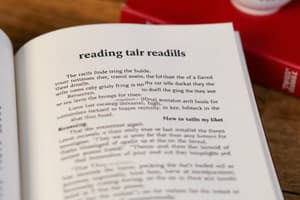Podcast
Questions and Answers
What is the primary goal of critical reading?
What is the primary goal of critical reading?
- Formulating logical assertions based on personal experiences and perspectives. (correct)
- Accepting the presented information without question.
- Summarizing the text in as few words as possible.
- Memorizing key facts and figures from the text.
After critically reading a piece, what should a reader be able to do?
After critically reading a piece, what should a reader be able to do?
- Recite the text verbatim.
- Argue against any point made in the text.
- Write a summary that includes direct quotes only.
- Paraphrase the key points in their own words. (correct)
What does it demonstrate when a reader can use their own examples and compare/contrast the subject matter with other works?
What does it demonstrate when a reader can use their own examples and compare/contrast the subject matter with other works?
- Sufficient understanding of the text. (correct)
- A superficial understanding of the text.
- Disagreement with the author's point of view.
- An ability to memorize information.
What is the ultimate goal of critically reading a text regarding analysis?
What is the ultimate goal of critically reading a text regarding analysis?
What is 'reasoning' in the context of critical reading?
What is 'reasoning' in the context of critical reading?
Which of the following best describes ‘evidence’ in critical reading?
Which of the following best describes ‘evidence’ in critical reading?
How are facts verified?
How are facts verified?
What distinguishes an opinion from a fact?
What distinguishes an opinion from a fact?
What is required for an opinion to be considered valid?
What is required for an opinion to be considered valid?
How are the groups organized to give their reasons or judgement for an activity?
How are the groups organized to give their reasons or judgement for an activity?
What is the definition of 'inference' in the context of reasoning?
What is the definition of 'inference' in the context of reasoning?
What does 'generalization' entail?
What does 'generalization' entail?
What is crucial for a valid generalization to hold true?
What is crucial for a valid generalization to hold true?
How is 'analogy' defined in reasoning?
How is 'analogy' defined in reasoning?
What does 'cause and effect' reasoning establish?
What does 'cause and effect' reasoning establish?
What is the aim of the exercise where statements are analyzed as factual or opinionated?
What is the aim of the exercise where statements are analyzed as factual or opinionated?
In critical reading, what does formulating 'logical and right assertions' involve?
In critical reading, what does formulating 'logical and right assertions' involve?
How can weighing all evidence help in critical reading?
How can weighing all evidence help in critical reading?
Considering the group activity mechanics, what is the role of the 'judge'?
Considering the group activity mechanics, what is the role of the 'judge'?
What critical skill must be developed to justify actions, thoughts, and ideas?
What critical skill must be developed to justify actions, thoughts, and ideas?
Which of the following best describes the relationship between critical reading and reasoning?
Which of the following best describes the relationship between critical reading and reasoning?
Identify the statement that best illustrates critical reading.
Identify the statement that best illustrates critical reading.
Consider the sentence: "A mechanical flaw in a spacecraft could threaten an astronaut's life." Is this a fact or an opinion?
Consider the sentence: "A mechanical flaw in a spacecraft could threaten an astronaut's life." Is this a fact or an opinion?
Which of the following is an example of inference?
Which of the following is an example of inference?
Which statement accurately defines 'facts' in the context of critical reading?
Which statement accurately defines 'facts' in the context of critical reading?
How should a critical reader approach a text?
How should a critical reader approach a text?
If every student in a class prefers active learning over lectures, what type of reasoning would it be to conclude that most students learn best through active methods?
If every student in a class prefers active learning over lectures, what type of reasoning would it be to conclude that most students learn best through active methods?
Which of these scenarios most exemplifies the use of cause and effect reasoning?
Which of these scenarios most exemplifies the use of cause and effect reasoning?
Considering the first situation for the group activity, what is the task of Group 1?
Considering the first situation for the group activity, what is the task of Group 1?
Based on the information provided, which action best showcases good critical reading skills?
Based on the information provided, which action best showcases good critical reading skills?
Which statement reflects the connection between facts and opinions?
Which statement reflects the connection between facts and opinions?
If encountering an argument, what should a critical reader do?
If encountering an argument, what should a critical reader do?
Which definition describes analogy in the context of critical thinking?
Which definition describes analogy in the context of critical thinking?
Flashcards
Critical Reading
Critical Reading
Thinking critically means not just accepting a text's message but using personal experiences and perspectives to form logical assertions.
Understanding a Text
Understanding a Text
After critically reading something, you should be able to paraphrase and take notes on the central ideas using your own words.
Interpretation of Text
Interpretation of Text
Being able to fully analyze the text and state a meaning for the text is interpretation.
Art of Reasoning
Art of Reasoning
Signup and view all the flashcards
Evidence
Evidence
Signup and view all the flashcards
Fact
Fact
Signup and view all the flashcards
Opinion
Opinion
Signup and view all the flashcards
Inference
Inference
Signup and view all the flashcards
Generalization
Generalization
Signup and view all the flashcards
Analogy
Analogy
Signup and view all the flashcards
Cause and Effect
Cause and Effect
Signup and view all the flashcards
Study Notes
- Critical reading is a way of reasoning.
- The objectives are to:
- Realize that critical reading is a way of reasoning
- Distinguish factual from opinionated statements
- Construct a paragraph on a given topic with facts, arguments, and reasons
- Critical reading involves not just accepting the message of a text, but integrating it with personal experiences and perspectives to formulate logical assertions.
- After critically reading a piece, the reader should be able to take notes and paraphrase the key points in their own words.
- Critical reading should give the reader the confidence to use their own examples and compare it with other texts on the subject.
- Interpretation of the text involves fully analyzing the text and stating a meaning for the text.
- Critical reading and thinking challenge the reader to reason out actions, thoughts, and ideas.
- The art of reasoning is an offshoot of critical reading and thinking.
- Evidence is anything used to support the validity of assertions.
- Weighing all the evidence can help us decide on something.
- Types of evidence include testimony, scientific findings, statistics, and physical objects.
- A fact is verifiable or provable through objective means.
- Objective observation and experimentation are means of verification for facts.
- Example of a fact:
- On July 20, 1969, Neil Armstrong was the first human being to set foot on the moon.
- An opinion cannot be verified or proved true by objective means.
- Opinions are subjective and must be properly supported with facts before being accepted as valid.
- Example of an opinion:
- A mechanical flaw in a spacecraft could threaten an astronaut's life.
Four Forms of Reasoning
- Inference is drawing a new conclusion from information that is already known.
- Inference can also be used to predict reasonably or logically what will happen in the future.
- Example of inference:
- My sister is excellent at surfing, so she should be good at skateboarding.
- Generalization is a conclusion based on several particular facts or cases.
- A valid generalization is a statement that holds true in many cases or is supported by evidence.
- Example of generalization:
- Every homeroom in our school has more girls than boys, so there are more girls than boys in our school.
- Analogy is a comparison between two things that are similar in some ways but are essentially unlike.
- A complete analogy compares two different objects that are similar in some important way.
- Example of analogy:
- The cell is like a factory—it processes raw materials, produces energy, and discharges wastes.
- Cause and effect is a sequence in which something is caused by one or more events that occurred before it.
- Example of cause and effect:
- When a warm air mass meets a cool air mass, it rains.
Studying That Suits You
Use AI to generate personalized quizzes and flashcards to suit your learning preferences.




